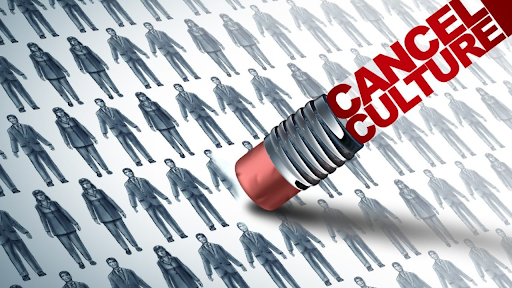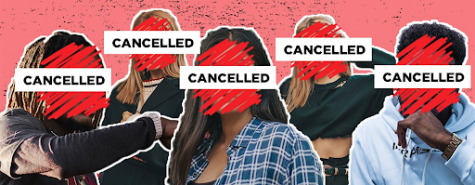Cancel Culture: Good or Bad?

Imagine being actively targeted by millions of people from behind the screen, trying to expose your secrets. This is called cancel culture, and people lose their careers and reputations because of it.
Cancel culture is where people, usually through the internet, expose other people, often celebrities or someone famous, of actions that they have committed in the past. This is used against them to make people dislike the person who is being cancelled, until they leave the internet or are left to live in shame.
“I have mostly witnessed it take place on twitter and a little bit of it on Tik Tok,” says Noah Nosrati, a 9th grade student who attends NHHS. Instances of cancel culture could be found anywhere on the internet.
But the most common place to find it is on Twitter, where people are being cancelled left and right. “I have seen a lot of cancellations on Twitter. It’s a social media with really toxic communities,” says Alex Dominick, a student who uses twitter.

Although not everyone participates in cancel culture, it is well known and is something that anyone who uses the internet may find out about eventually. “No, I haven’t been interested. I’ve seen videos about it, but it really just seems like people trying to bring others down out of spite and envy,” says Arthur Avetisyan, an artist who knows the platform. Cancel culture is also quite a popular topic in YouTube videos as well, being a good source of information, or just plain old entertainment.
Cancel culture is well known, but that doesn’t necessarily mean that everyone takes interest in it. “Am I interested in cancelling? Not really, most of the people online that participate in it cancel the wrong people for the wrong reasons,” says Isabella Greenfield, who engages in online communities. A lot of people tend to stay away from cancel culture, to avoid being cancelled or included in drama.
Although sometimes the influence of cancel culture may have a positive effect, and could be a good thing. “Cancel culture goes well sometimes. There are a good amount of genuinely terrible people who didn’t deserve their fame who got canceled for a good reason,” says 9th grader Charlize Terityan. Cancelling evil people helps keep social networks safer and makes the internet a little bit of a better place.

Still, most instances of cancel culture are unnecessary and damaging. Plus, a lot of cancelling revolves around bias and mistakes. “Some of the time it is backed by little evidence, or the evidence is taken out of context.” says Nosrati.
Plus, everyone makes mistakes, and it depends on how severe it is to determine whether someone deserves to be cancelled or not. “I think sometimes cancel culture is good but other times it can go too far. For example there was a youtuber who I watched who was canceled for something without evidence and people ended up sending him death threats which I think goes too far. Evidence or not nobody should receive death threats,” Nosrati continues.
Therefore, a lot of people generally don’t like cancel culture. “Overall, cancel culture is unnecessary in my opinion because it’s toxic and brings more hate instead of just trying to resolve the problem at the base of it,” says Giorgio Cataldo.
When it comes to the usefulness of cancel culture, it does a lot of good by eliminating terrible people, and has a good concept. But overall, it clearly lacks in many ways and causes more harm than it does good due to how poorly it is executed by most people, which is why it is considered toxic by a big majority of the internet and should be avoided.
Your donation will support the student journalists of North Hollywood High School. Your contribution will allow us to purchase equipment and cover our annual website hosting costs.

Hello! I am the graphic editor of the NHHS Arcade. I mainly create articles based on culture, arts, and entertainment.
